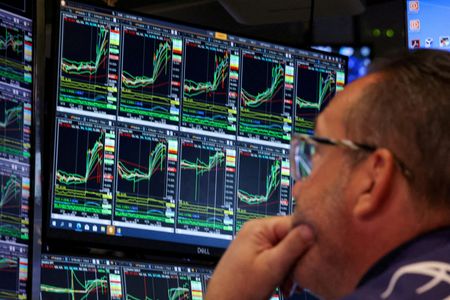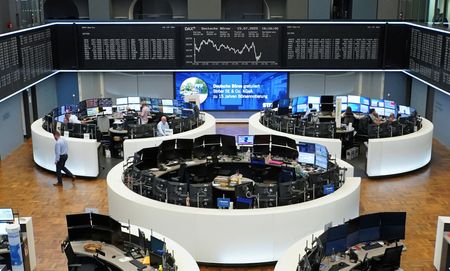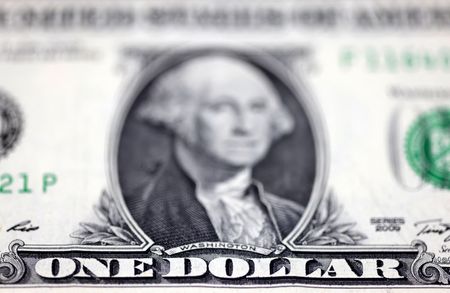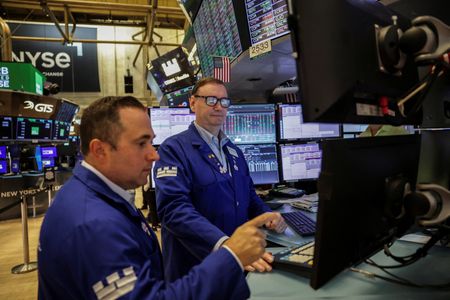By Sinéad Carew and Marc Jones
NEW YORK/LONDON (Reuters) -MSCI’s global equity index was advancing on Thursday while the dollar rose as investors were encouraged by the latest crop of economic data and earnings reports.
Data on jobless claims showed that the number of Americans filing new applications for unemployment benefits fell last week, pointing to steady job growth so far in July, though some laid off workers are experiencing long spells of unemployment because of a moderation in hiring.
U.S. retail sales rebounded more than expected in June, but some of the increase likely reflected higher prices for some goods exposed to tariffs.
“In economic data two key releases came out today: retail sales and jobless claims. Both were better than anticipated,” said Mike Cornacchioli, investment strategy director and senior vice president at Citizens Private Wealth.
“Those two illustrate the strength of the consumer and the labor market. So, a lot of the fears that were placed on the state of the U.S. economy are overblown and have failed to come to fruition at this point in time. Maybe they will some time down the line, but this data and the data that’s come in lately has just reinforced the strength of the US economy.”
Cornacchioli also pointed to strong earnings reports as a boost for equities on Thursday.
Taiwan Semiconductor Manufacturing, the world’s main maker of advanced AI chips, posted record profits ahead of expectations. It warned that future income might be hit by U.S. tariffs, though perhaps not until the fourth quarter. Also, GE Aerospace lifted its profit outlook with jet engine deliveries rising as efforts to fix supply constraints showed results.
MSCI’s gauge of stocks across the globe rose 3.86 points, or 0.42%, to 924.97.
Europe’s STOXX 600 index rose 0.92%, boosted by strong earnings after record orders at Swiss engineering firm ABB and record $13.5 billion profits.
And Wall Street followed Europe higher but at a more modest pace. At 11:17 a.m. the Dow Jones Industrial Average rose 72.83 points, or 0.16%, to 44,327.61, the S&P 500 rose 20.73 points, or 0.33%, to 6,284.32 and the Nasdaq Composite rose 142.41 points, or 0.69%, to 20,872.92.
Thursday’s gains follow a dramatic wobble during the prior session when Trump said he was highly unlikely to fire Federal Reserve chair Jerome Powell. However he left the door open to the possibility of ousting him and renewed his criticism of the central bank chief for not cutting U.S. interest rates.
In currencies, the dollar rose on Thursday after the economic data.
Against the Japanese yen, the dollar strengthened 0.47% to 148.56 as polls showed Prime Minister Shigeru Ishiba’s coalition was in danger of losing its majority in the upper house in upcoming elections.
The dollar index, which measures the greenback against a basket of currencies including the yen and the euro, rose 0.37% to 98.71. The euro was down 0.4% at $1.1587.
U.S. Treasury yields edged lower after briefly spiking following the economic data which showed the world’s largest economy on a stable footing and supported the Fed’s patient stance on monetary easing.
The yield on benchmark U.S. 10-year notes fell 1.2 basis points to 4.443%, from 4.455% late on Wednesday while the 30-year bond yield fell 2.4 basis points to 4.9905% from 5.015%.
However, the 2-year note yield, which typically moves in step with interest rate expectations for the Federal Reserve, rose 2.4 basis points to 3.909%, from 3.885% late on Wednesday.
In commodity markets, oil prices rose even as global trade tensions appeared to cool, with analysts pointing to low inventories and renewed Middle East risks as factors supporting the market.
U.S. crude rose 1.18% to $67.16 a barrel and Brent rose to $68.99 per barrel, up 0.69% on the day.
Gold prices were lower after the upbeat U.S. economic data aided the Fed’s cautious stance on rate cuts.
Spot gold fell 0.42% to $3,332.19 an ounce. U.S. gold futures fell 0.63% to $3,331.40 an ounce.
(Reporting by Sinéad Carew in New York, Marc Jones in London, Rae Wee in Singapore; Editing by Ros Russell, William Maclean)












